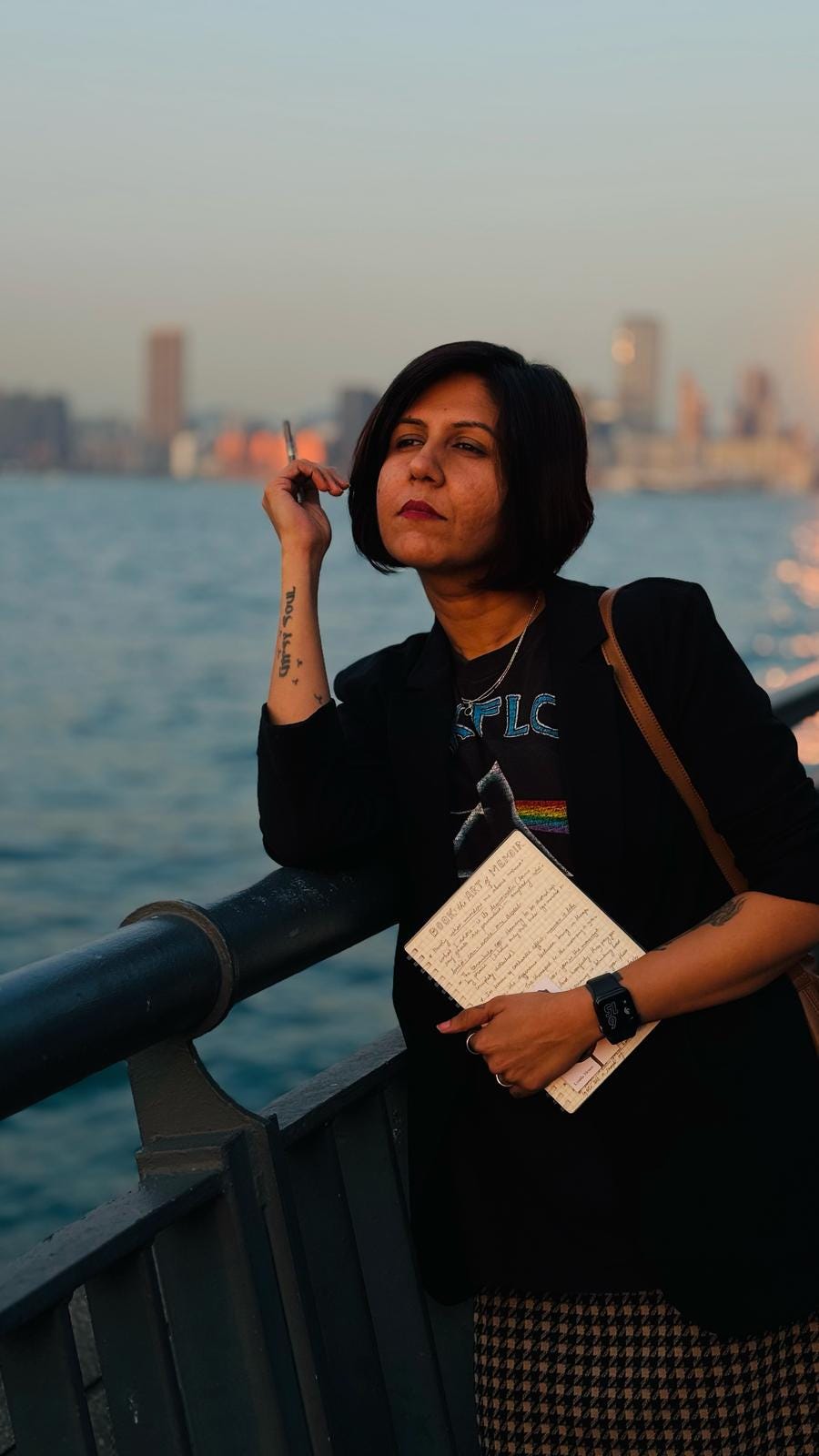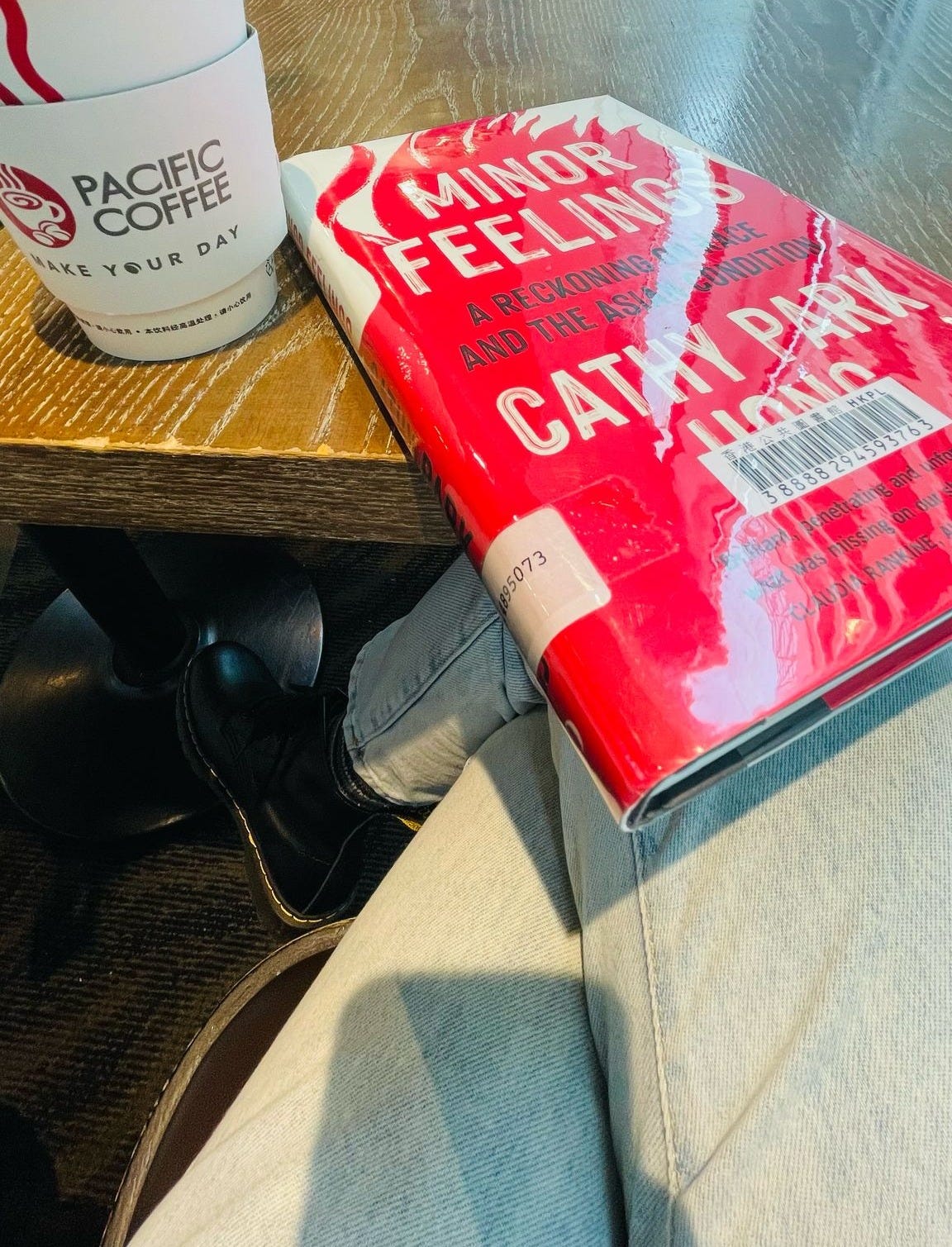When Your Invisibility Meets Someone Else’s..
You find your pain mirrored in another’s story—and realize empathy isn’t a competition, but a bridge?
I’ve been stuck. Not the kind of stuck where you’re waiting for inspiration to strike or trying to figure out what to cook for dinner—this was deeper. I’m nearing the final chapters of my book, and suddenly, the weight of how it should end feels unbearable. How do I wrap up something so personal, so layered? Should I go quiet and introspective, explosive and dramatic, or settle somewhere in between?
So, like any writer with a case of creative block, I turned to libraries—the cathedrals of human thought. And thank God for them because they delivered exactly what I needed. Among the rows of books, one title stood out: Minor Feelings by Cathy Park Hong. The wordplay alone hooked me—"minor feelings," that subtle ache of being unseen, unheard, dismissed. It felt eerily familiar.
Hong writes about growing up Korean American, navigating race, identity, and the complexities of belonging. As someone whose own background is tangled in shades of brown and beige, her words struck a nerve. They weren’t just relatable; they were hauntingly reflective of my own experiences. But at first, I’ll admit, I wasn’t sure how to feel about that.
The Invisible Robbery
The opening question of the book hit me like a punch: “How do you feel when your own experiences are consistently dismissed by a white world that doesn’t recognize your reality?”
My immediate reaction? Irritation. Wait a second, I thought, isn’t this my feeling? This invisibility cloak I’ve worn for years, blending into walls during meet-ups, shrinking myself in group settings—it’s mine. Who gave her permission to feel it too?
But as I kept reading, that irritation melted into recognition. When she talks about Asians taking up “apologetic space,” I winced. She describes going to read poetry in front of an audience and feeling like her presence itself was intrusive. That could have been me recounting countless moments from my seven years living in Hong Kong. Reading her words felt like looking into a mirror—and realizing I wasn’t the only one who saw cracks in its surface.
Parallels in Pain
As I delved further, I found more parallels. Like me, Hong struggles with anxiety, constantly bracing for rejection before anything even happens. There’s a chapter where she recounts searching for a therapist—a Korean one, no less—and spiraling into panic over whether she’d be understood or rejected outright. Slowly that feeling of rivalry diluted into a lopsided facial twitch as I subconsciously drew parallels with her personality and how similar we were. Her experience made me revisit the time I was looking for mine and about the parameters I had in mind. I wanted someone Asian so they understand the type of familial ties we have but I didn’t want an Indian therapist because then we assume that everything dysfunctional about our family is cultural. I love this line from the book that nails the thought process , ‘ Sometimes you need to explain your experiences in order to understand them.’
Her descriptions of self-loathing resonated deeply. She speaks of feeling inadequate—not white enough, not black enough, stuck in limbo while others move ahead. Of being overlooked for promotions because you don’t “have the face.” These aren’t just her battles; they’re ours too. Yet, as much as I related, there was also this nagging voice in my head whispering, See? They don’t have it easy either. But then another voice rebutted: Does that make it okay when people treat us the same way?
It’s messy, right? Empathy can feel like competition sometimes. You want validation for your pain without diminishing someone else’s. And yet, here we both were—in different bodies, different histories, but sharing the same emotional landscape.
I related so hard when she said that ‘ I am an unreliable narrator, hyper vigilant to the point of being paranoid, imposing all my insecurities.’ Sometimes it feels like a blur when I feel these feelings in meet-ups or group settings where I am the only brown female or among the 3 of them. It’s worse because I can’t even talk about this to someone because the worst that can happen is someone dismissing it as being too sensitive or denying it all together so keeping it in my head and writing voraciously on my Substack or book seems to be the plausible thing to do.
Broadening the Lens
What makes Minor Feelings truly remarkable is its inclusivity. While Hong focuses on her Korean American experience, she zooms out to examine racism across all shades of non-white. She covers everything from micro aggressions to systemic oppression, weaving together stories that transcend individual identities. At one point, she recounts a disturbing incident involving an Indian female colleague, capturing perfectly the double-edged sword of assimilation: “Assimilation must not be mistaken for power, because once you acquire power, your model minority qualifications can be used against you since you are no longer invisible.”
This line stopped me cold. How many times had I seen this play out? People climbing ladders only to realize they’ve become targets once they step into the spotlight. Assimilation isn’t liberation—it’s often just another trap.
A Systemic Petty Race
Another insight that hit home was her observation about intra-community rivalry among minorities. “When there are only two Asians, instead of uniting, one may try to take the other out,” she writes. It’s a behavior I’ve witnessed more times than I care to admit. Why do we sabotage each other instead of recognizing that solidarity would serve us better? It’s like we’re trapped in a systemic petty race, clinging to whatever scraps of power we’re given while refusing to share.
And yet, despite these flaws, Hong manages to highlight the humanity in all of us. Her storytelling is raw, unflinching, and compassionate—not just toward herself but toward everyone caught in the web of racial dynamics. But something that made me double take was this line, ‘What if my cannibalizing ego is not a racial phenomenon but my own damn problem? Cathy! Don’t make me doubt myself on this too!
Parallel Realities
Reading Minor Feelings reminded me of something crucial: none of us exist in isolation. Our struggles might differ in nuance, but they’re interconnected. It’s not a race for survival between brown, black, or Asian communities—we’re all navigating parallel realities shaped by the same oppressive systems. Some days, it feels impossible to see beyond our own tunnel vision, especially when we’re buried neck-deep in our own pain. But books like this force us to look up, to acknowledge the broader picture.
Is there a way out? A definitive end to these cycles of discrimination and misunderstanding? Probably not anytime soon. But if there’s one thing I’ve taken away from Hong’s work, it’s this: compassion is key. Compassion for ourselves, for others, and for the messy, imperfect process of understanding. It’s tough, especially now, but as the saying goes, “When the going gets tough, the tough get going.”
For now, I’ll keep writing, keep exploring these themes in my book, and hope that somewhere out there, someone will read it and feel less alone. Because that’s the beauty of storytelling—it reminds us that we’re never truly invisible, no matter how small we feel.
P.S. : If you haven’t read Minor Feelings , add it to your list. Trust me—you won’t regret it.
P.P.S : I went ahead with this article because I did a little bit of a poll on my IG and 100% of the votes said go ahead with this topic. A bit of background for you:) Also thanks to the cuties who voted on the poll!







